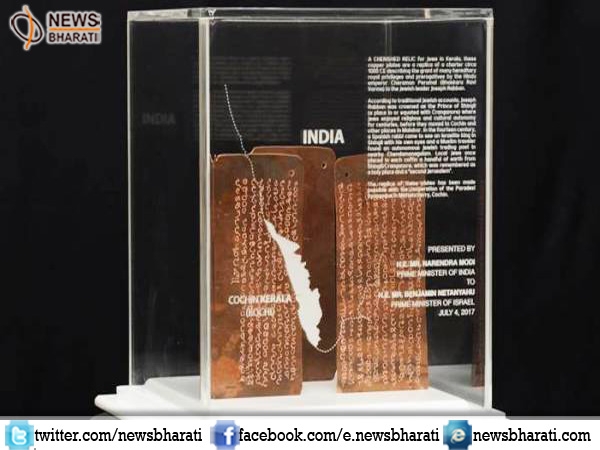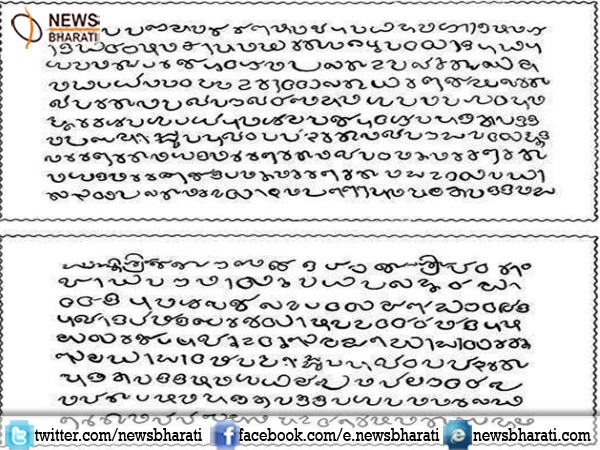Look at these copper plates which still tells Indo-Israel relation sagas
Mumbai, January 15: Maintaining foreign relations is a very crucial part of every country. A good relation with other countries yields good fruits for one’s nation. But this maintaining relation is not a new concept if one says that is centuries old then? yes it is true as below is the proof, the picture shows nearly 1600 years old copper plate which welcomes a Jewish leader to India.

The history of the Jewish people in India dates back to ancient times. Judaism was one of the first foreign religions to arrive in India in recorded history. Indian Jews are a religious minority of India, but unlike many parts of the world, have historically lived in India without any instances of antisemitism from the local majority populace, the Hindus.
The Jewish copper plate is a copper-plate charter issued by the Chera king of Cranganore, Bhaskara Ravi Varma (named as Parkaran Iravivanmar), and granting land to a Jewish trader, Joseph Rabban of Cochin. Cranganore is where Jews enjoyed religious and cultural autonomy for centuries before they moved to Cochin and other places in Malabar. Although the traditional date according to the Cochin Jews is 379 CE, the presently accepted date of this inscription is 1000 CE. It is the earliest evidence of a Jewish community settling in India, although local tradition has it that a previous settlement in Malabar dates to the early centuries CE.

The document records a royal grant to the Jewish chief Joseph Rabban of the rights of Ancuvannam along with the 72 proprietary rights enjoyed by high-ranking nobles of Chera kingdom. It is engraved on two small, rectangular copper-plates. The second side of the second plate is blank. A hole for the ring on which the plates must have been strung is visible under the impression of each plate. The inscriptions on the plates are in archaic Tamil written using the vatteluttu alphabet. Grantha letters are used in a number of Sanskṛit words and for the foreign word "Issuppu".
The translation of these inscriptions is as follows:
"Hail! Prosperity! (The following) gift was made by him who had assumed the title "King of Kings," His Majesty the king, the glorious Bhāskara Ravivarman, in the time during which (he) was wielding the sceptre and ruling over many hundred-thousands of places, in the thirty-sixth year after the second year, on the day on which (he) was pleased to stay at Muyirikkôdu:-
We have given to Issuppu Irappân (the village of) An̄juvannam, together with the seventy-two proprietary rights, the tolls on female elephants and (other) riding-animals, the revenue of An̄juvannam, a lamp in day-time, a cloth spread (in front to walk on), a palanquin, a parasol, a Vaduga (i.e., Telugu) drum, a large trumpet, a gateway, an arch, a canopy (in the shape) of an arch, a garland, and so forth.
We have remitted tolls and the tax on balances.
Moreover, we have granted, with (these) copper leaves, that he need not pay (the dues) which the (other) inhabitants of the city pay to the royal palace, and that (he) may enjoy (the benefits) which (they) enjoy. To Issuppu Irappān of An̄juvannam, to the male children and to the female children born of him, to his nephews, and to the sons-in-law who have married (his) daughters, (we have given) An̄juvannam (as) a hereditary estate for as long as the world and the moon shall exist. Hail!"
The charter ends with a list of witnesses to the deed which includes the heads of five districts, the sub-commander of the forces, and the under-secretary who drafted the grant. A later translation is as follows:
"Hail Prosperity (Svasti Sri), this is the gift (Prasada) that His Majesty (Tiruvadi), King of Kings (Kogonmai-kondan), Sri Parkaran Iravivanmar, who is to wield sceptre for several thousand years, was pleased to make during the thirty-sixth year opposite to the second year of his reign, on the day when he was pleased to reside at Muyirikkottu.
We have granted to Issuppu Irappan, the Ancuvannam (corporation/guild), tolls by the boat and by other vehicles, Ancuvannam dues, the right to employ the day lamp, decorative cloth, palanquin, umbrella, kettle drum, trumpet, gateway, arch, arched roof, weapons and rest of the seventy two privileges. We have remitted customs, dues and weighing fee.
Moreover, according to this copper-plate grant, he shall be exempted from payments due to the king (koyil) from settlers in the town, but he shall enjoy what they enjoy.
To Issuppu Irappan, proprietor of the Ancuvannam, his male and female issues, nephews, and son-in-law, Ancuvannam shall belong by hereditary succession as long as the sun and moon endure - Prosperity!"